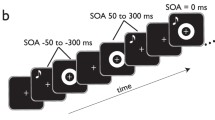Abstract
2 procedures, visual cue fading and task complexity, involved in teaching simple auditory discriminations were investigated. 20 severely retarded children were assigned to 1 of 4 treatment groups in a 2 x 2 factorial design. Analysis of variance on the final day’s data indicated differences favoring visual cue fading procedures and indicated that a 2-stimulus task is much more difficult than a 1-stimulus task. Another analysis of variance showed only differences in task difficulty. The need for further investigations into the variables affecting auditory discrimination is indicated.
Similar content being viewed by others
References
BAUMEISTER, A. A. 1967. Learning of the mentally retarded. In A. A. Baumeister (Ed.), Mental retardation: Appraisal, education, and rehabilitation. Chicago: Aldine.
BRICKER, W. A., & BRICKER, D. D. 1968. Four operant procedures for establishing auditory stimulus control with low functioning children. American Journal of Mental Deficiency, 73 (6), 981–987.
DENNY, M. R. 1964. Research in learning and performance. In H. A. Stevens & R. Heber (Eds.), Mental retardation. Chicago: University of Chicago Press. Pp. 100-142.
KURTZ, P. S., & JONES, J. P. 1969. Response development in a passive “deaf” retardate. Michigan Mental Health Bulletin, 3 (4), 31–33.
LILLYWHITE, H. S., & BRADLEY, D. P. 1969. Communication problems in mental retardation. New York: Harper & Row.
McREYNOLDS, L. V. 1967. Verbal sequence discrimination training for language impaired children. Journal of Speech and Hearing Disorders, 32, 249–256.
MECHAM, M. J., BERKO, M. J., BERKO, F. G, & PALMER, M. F. 1966. Communication training in childhood brain damage. Springfield, Ill: Charles Thomas.
MEYERSON, L., & MICHAEL, J. L. 1960. The measurement of sensory threshold in exceptional children. Cooperative Research Project, No. 418, United States Office of Education.
ROBINSON, H. B, & ROBINSON, N. M. 1965. The mentally retarded child. New York: McGraw Hill.
SCHLANGER, B. B., & GALANOWSKY, G. I. 1966. Auditory discrimination tasks performed by mentally retarded and normal children. Journal of Speech and Hearing Research, 9, 434–440.
SMITH, J., ANDERSON, V., CUNNINGHAM, T., & SJOBERG, W. A. 1967. A comparison of auditory and visual discrimination learning in retardates. American Journal of Mental Deficiency, 72 (3), 228–241.
STEVENSON, H. W. 1963. Discrimination learning. In N. R. Ellis (Ed.), Handbook of mental deficiency. New York: McGraw-Hill. Pp. 424–438.
WEBB, C. E., & KINDE, S. 1967. Speech, language, and hearing of the mentally retarder. In A. A. Baumeister (Ed.), Mental retardation: Appraisal, education, and rehabilitation. Chicago: Aldine. Pp. 96–119.
WEINER, P. S. 1967. Auditory discrimination and articulation. Journal of Speech and Hearing Disorders, 32, 19–28.
ZEAMAN, D., & HOUSE, B. J. 1963. The role of attention in retardate discrimination learning. In N. R. Ellis (Ed.), Handbook of mental deficiency. New York: McGraw-Mill. Pp. 159–223.
Author information
Authors and Affiliations
Additional information
This research was supported by a grant from the Michigan Department of Mental Health, Grant No. 103-2200-176.
Rights and permissions
About this article
Cite this article
Harvey, E., Bornstein, R. The Effects of Visual Cue Fading and Task Complexity On Auditory Discrimination in Severely Retarded Children. Psychol Rec 24, 109–117 (1974). https://doi.org/10.1007/BF03394222
Published:
Issue Date:
DOI: https://doi.org/10.1007/BF03394222




